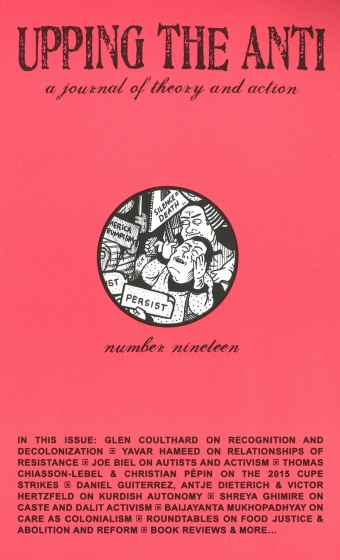A Response to the “Who Cares?” Editorial
Dear UTA,
The recent Upping the Anti editorial, “Who Cares? The Politics of Care in Radical Organizing,” deconstructs and critiques the concept of self-care. The Editorial Collective discusses how the concept of “self” and “care” are individualized to serve capitalism. The authors suggest that self-care can often support and reproduce the very relations of power that we are resisting in activist spaces. Building on knowledge and analysis from disabled and/or racialized women and non-binary people and knowledge gained through my own life experiences, I agree with the main argument made in the editorial that collective/community care is not just a tool in supporting resistance movements, but is an integral part of building a different world together.
The editorial collective’s critique of self-care discusses how frequently it is actually a coping strategy done in order to return to a productive state under capitalism. This logic is unfortunately also reproduced in activist spaces. In my experience organizing, I have stepped back from certain spaces as a part of trying to heal from experiences of intimate partner violence. At first, my step back from activism in these spaces was about self-care in order to return to productivity. I realized upon attempting to return to the productive organizer I had once been that I needed to step out of spaces that were task-oriented rather than relational because the orientation towards tasks rather than relationships felt like a continuation of capitalist logics that kept me in crisis mode in the same way the abusive relationship I was in did. It can be difficult to distinguish between self-care as coping and self-care as healing, and in moving towards a different world these are not always distinct and both can be necessary in order to survive/thrive.
When I read, “if we organize together in the name of collective liberation, why are we expected to care for ourselves individually?” I can’t help but think of all the shit we deal with outside of meetings that we are often expected to put aside in meetings or at actions in the name of productivity. Yes, there are crises happening every day. There are people dying and experiencing extreme violence, and responding is vital. However, being consistently exposed to trauma, individuals and collectives are put in survival mode where they/we cannot connect to long-term decision-making tools. Chris Dixon’s discussion of “crisis-mode organizing” feels relevant here: often movements become good at responding to crises but are less effective at building towards a world without the violences inherent in capitalism. We are traumatized, our movements are traumatized, and it is difficult to connect to a vision of where we want to be in the long-term when we are constantly being forced to respond to a violent present.
In this context, the editorial’s discussion of collective/community care was very thoughtful and moves us in the direction of balancing long-term goals with short-term responses. The editors write, “This concept of community care, at its core, is about taking collective accountability for the spaces we create together to ensure that how we organize is just as important as what we organize.” I would stress here that collective care is not just part of supporting resistance movements, it is resistance in its own right. When we think about collective care we need to think about capacity and how those of us in movements are using it. Activism can be a space for healing that feeds and energizes us. However, activism can also reproduce the same systems of oppression that we fight against not only through mandating self-care but through not collectivizing the care of bodies that bear the brunt of white supremacist, disableist, cisheteropatriarchy. This means that movement spaces should be meaningfully engaged in “understanding our collective interdependence,” and in doing so, learning how to relate with others as more than just our productive capacity. This can appear to some as “slowing down,” which can feel frustrating in the context of present injustices, but the benefit is that we begin to build movements that are more inclusive and hopefully reflect the world we want to see. There is a lot to learn from disability and reproductive justice movements on these fronts. I really appreciate what the Editorial Collective wrote on the topic of self-care, especially the emphasis placed on community care and community building. If readers want to support efforts like this I would also suggest folks donate to Black Lives Matter- Toronto Freedom School, Giwaabamin Street Patrol, or efforts in their city aimed at meeting people’s needs while building and being in a more just world.
In solidarity,
Merle Davis
Toronto, ON

